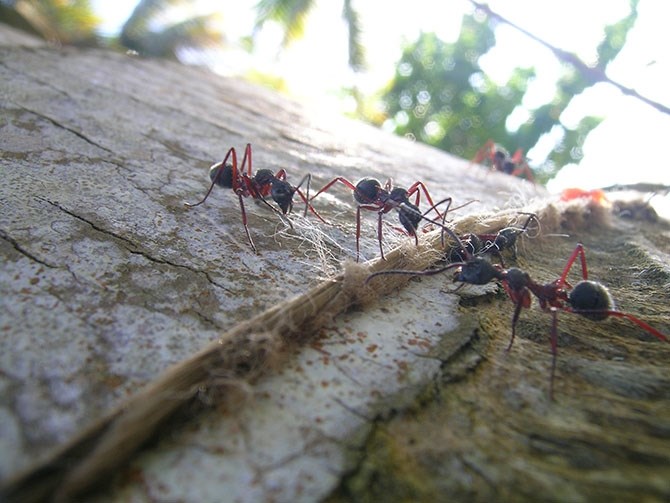
Ants can be a beneficial species in nature, but when large numbers start to invade a homeowners living space, they can become a problem.
Image Credit: WIKIMEDIA COMMONS
August 17, 2021 - 8:00 AM
Most insects prefer damper conditions than what Kamloops and the Okanagan have been experiencing this summer, but some bugs fare much better than others when conditions are dryer than normal.
“I’m not really noticing too many insects, they generally don’t like it hot and dry,” associate professor of biology at UBC Okanagan Dr. Bob Lalonde said. “They like it a little bit more moderate and dry."
Some bugs can tolerate hot and dry conditions better than others, but their small sizes make it difficult to retain water for long periods.
“The fact remains they don’t have this huge reservoir we have,” Lalonde said.
The staff at Lyons Landscaping and Garden Centre in Kamloops have noticed tiny pests like aphids, spider mites and ants to be more prevalent this year.
“Aphids and spider mites have been fairly common this season with spider mites being more prevalent on indoor tropicals and aphids being a strong pest for fruit trees especially this season after the shock many of these trees experienced from the heat wave,” Lyons retail manager Kristina Bradshaw said.
“There seem to be fewer ladybugs than other years – likely a reason why the aphids have been stronger as ladybug larva feast heavily on aphids.”
READ MORE: Pest Control Services in Kelowna and Area
Bradshaw said grasshoppers have very strong numbers this year, and they’re hard to control so they’ve been a source of frustration for hardeners. Caterpillars - particularly tent caterpillars - are being spotted at their usual levels, which have been quite high over recent years. They can inflict significant damage on trees and shrubs.
It’s too soon to say whether or not it will be a heavy season for wasps, but Bradshaw said they haven’t come out in strong numbers yet.
She said the unusually hot summer in Kamloops, which saw temperatures reaching mid-40 degrees Celsius, was challenging even for plants that are climatized to a semi-arid desert.
“Pine trees showed a considerably dramatic effect of this heat as the usually very tolerant trees have shown large patches of brown-burn from sun scorch,” she said. “Even the well-watered plants couldn’t go unscathed through that intense period… Although our native plants are drought tolerant, they still rely in the occasional rain that they haven’t seen yet this summer and are struggling or dying or stunted as a result. As soon as the temperatures went back to normal the smoke rolled in.”
An intense wildfire season can lead to a series of problems for gardeners.
“The smoke coats leaves that plants/trees ‘breathe’ through with ash and debris so it can negatively impact their ability to photosynthesize,” Bradshaw said.
“Add to that the fact that the smoke is blocking out some of the sun rays and we are seeing a lot of vegetative life slow down growing or stop growing as a result. Some plants are going into an early hibernation as if it were already fall due to the less hours of daylight triggering their natural process of change through seasons.”
READ MORE: Three common garden pests - and a 17-year visitor who isn't
The team at Bylands Garden Centre in West Kelowna have also noticed the intense heatwaves have had a negative impact on some plants.
“We’re seeing more heat stress on plants than any other year,” Bylands owner Maria Byland said.
Gardeners can mitigate the damage by shading their plants from the intense rays, she said, but the heat can still cause damage even without direct sunlight.
Byland recommends watering plants in the morning and evening, and reminds gardeners that overhead watering can magnify the heat from the sun.
The intense heat isn’t all bad news for plants, as pests are less of a nuisance this year, she said.
“It has been pretty typical of other years,” Byland said. “But if anything there are probably even less because – especially aphids – it’s almost too hot for them to be out, so the heat is been beneficial that way.”
To contact a reporter for this story, email Dan Walton or call 250-488-3065 or email the editor. You can also submit photos, videos or news tips to the newsroom and be entered to win a monthly prize draw.
We welcome your comments and opinions on our stories but play nice. We won't censor or delete comments unless they contain off-topic statements or links, unnecessary vulgarity, false facts, spam or obviously fake profiles. If you have any concerns about what you see in comments, email the editor in the link above.
News from © iNFOnews, 2021